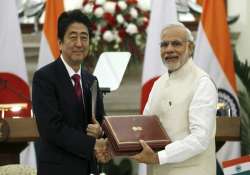Shinzo Abe's visit: 10 areas of cooperation identified by India and Japan
New Delhi: India and Japan on Friday formalised a number of bilateral agreements in key areas including defence cooperation, nuclear energy and building of the first high-speed bullet train network at a cost of about

New Delhi: India and Japan on Friday formalised a number of bilateral agreements in key areas including defence cooperation, nuclear energy and building of the first high-speed bullet train network at a cost of about Rs 98,000 crore.
The agreements are part of the three-day visit of Japanese Prime Minister Shinzo Abe to India. “We have taken our relationship to a new level,” Abe said on Friday. Praising Modi's reforms agenda, the Japanese premier said, “Prime Minister Modi's speed of implementing policies and reforms is like Shinkansen (bullet train) and his reform agenda is as safe as Shinkansen.”
Here is a list of key areas and developments where India and Japan will further their engagement:
1. Nuclear Energy
Indian Prime Minister Narendra Modi and Japan PM Shinzo Abe inked an agreement on civil nuclear energy. A Memorandum on ‘Agreement on Cooperation in the Peaceful Uses of Nuclear Energy' was signed by two sides. “We have reached substantive agreement on Civilian Nuke agreement...concluding negotiations on civil nuclear cooperation with Japan is very big step,” said Foreign Secretary S Jaishankar.
2. High Speed Railways
Both sides also reached an agreement on developing India's first high-speed bullet train network on the Mumbai-Ahmedabad corridor. Japan has given India a highly concessional loan with repayment period of 50 years and a 15-year moratorium. The loan has an interest rate of 0.1 per cent. The high-speed rail will be built using Japan's Shinkansen technology.
3. Defence Cooperation
The two countries have also agreed to take forward their cooperation in the areas of security and defence manufacturing. Two deals have been signed in this regard. The agreements – titled ‘Transfer of Defence Equipment and Technology' and ‘Security Measures for Protection of Classified Military Information' – are expected to deepen defence ties between the two nations and also provide a boost to defence manufacturing in India, Modi said.
4. Trade and Investment
A special finance facility of up to 1.5 trillion Yen has been set up by the Nippon Export and Investment Insurance and the Japan Bank for International Cooperation to promote Japanese investments into India. Focussed on Make In India, the facility will support business activities, including development of necessary infrastructure to promote investments under the Make In India programme.
5. Double Taxation Avoidance Agreement
An agreement was reached between both sides to amend the framework for exchange of information for the avoidance of double taxation which has been in place since 1989. The amended convention will facilitate smoother exchange of information between India and Japan. It will also act as a deterrent in reducing tax avoidance and evasion.
6. Technological Cooperation in Rail Sector
A memorandum was signed between the two sides for comprehensive technological cooperation including sharing of information and best practices between both countries. The agreement will facilitate exchange of officials and technicians, besides facilitating participation of other institutions, organizations and ministries for joint research. An MoU on cooperation in maintenance and security in train operations was also signed by both sides.
7. Science and Technology
An agreement to promote collaborative activities including joint research projects and scientific meetings between research institutes has been signed. Communication technology including the Internet of Things, Artificial Intelligence and Big Data Analysis will be under the ambit.
8. Education
India and Japan have agreed to establish a young researcher's exchange programme for the promotion of science. The agreement proposes to establish a reciprocal Fellowship programme for capacity building and human resource development in frontier areas of Science & Technology. Developing connectivity and new networks between the next generation of scientific leadership in India and Japan is also on the cards.
A separate agreement encouraging development of contacts and cooperation between educational institutions of the two countries, including exchange of aspiring students has also been inked. Both sides also agreed to enhance collaboration between IIM, Ahmedabad and the National Graduate Institute for Policy Studies.
9. Energy Sector
India's NITI Aayog and Institute of Energy Economics, Japan will collaborate to analyse issues related to the energy sector. The partnership would help both sides understand global issues related to the energy sector. Issues such as availability, production, consumption, sectoral demands, local and global environmental impacts and implications of changes in energy prices and technology will be studied.
10. Visa on Arrival
PM Modi had earlier also announced visa on arrival for Japanese nationals from March 1, 2016. Modi said that this was over and above the Electronic Tourist Visa (ETV) that India extends to visitors from 113 countries. Both leaders also met a group of top business leaders from both countries at the India-Japan Business Leaders Forum, in New Delhi.
The two leaders have reached Varanasi, PM Modi's Lok Sabha constituency, where they will attend Ganga aarti at the famous Dasaswamedh Ghat.